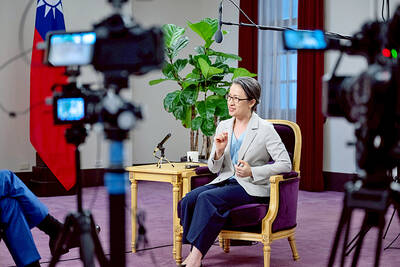Air quality across the western half of Taiwan is to be extremely poor today and remain poor in the south throughout the week, with residents advised to avoid outdoor activities, meteorologist Wu Der-rong (吳德榮) said.
From today through Saturday, air quality in southern Taiwan is entering a “red alert,” meaning the air is unhealthy for all groups, Ministry of Environment data showed.
The northern and central regions are on “orange alert” today, meaning unhealthy for sensitive groups.

Photo: CNA
However, tomorrow would see an improvement for Miaoli County and areas to the north to a “yellow alert.”
Today, central and northern Taiwan are to experience mid-level moisture and increasing cloud cover, bringing a slight chance of light, scattered rain in some areas, said Wu, a former Weather Forecast Center director who is now an adjunct associate professor of atmospheric sciences at National Central University.
The next two days would see mostly cloudy to partially sunny conditions across the country with slightly warmer weather to the south, although the western region could see fog, he said.

Photo courtesy of the Ministry of Environment
Temperatures would remain cool in the mornings and evenings, he added.
The latest European simulation model indicates that sunny weather is expected from Friday until Monday next week, with temperatures exceeding 30°C in some areas, although still with some fog, he said.
A weather front is expected to approach on Monday evening bringing an increased chance of rain, which would pass through on Tuesday morning, bringing rainfall as cold air moves southward and temperatures drop, he said.
Weather models suggest a continental cold air mass would move toward Taiwan from Wednesday until Friday next week, although monitoring would continue, he added.

China might accelerate its strategic actions toward Taiwan, the South China Sea and across the first island chain, after the US officially entered a military conflict with Iran, as Beijing would perceive Washington as incapable of fighting a two-front war, a military expert said yesterday. The US’ ongoing conflict with Iran is not merely an act of retaliation or a “delaying tactic,” but a strategic military campaign aimed at dismantling Tehran’s nuclear capabilities and reshaping the regional order in the Middle East, said National Defense University distinguished adjunct lecturer Holmes Liao (廖宏祥), former McDonnell Douglas Aerospace representative in Taiwan. If

TO BE APPEALED: The environment ministry said coal reduction goals had to be reached within two months, which was against the principle of legitimate expectation The Taipei High Administrative Court on Thursday ruled in favor of the Taichung Environmental Protection Bureau in its administrative litigation against the Ministry of Environment for the rescission of a NT$18 million fine (US$609,570) imposed by the bureau on the Taichung Power Plant in 2019 for alleged excess coal power generation. The bureau in November 2019 revised what it said was a “slip of the pen” in the text of the operating permit granted to the plant — which is run by Taiwan Power Co (Taipower) — in October 2017. The permit originally read: “reduce coal use by 40 percent from Jan.

‘SPEY’ REACTION: Beijing said its Eastern Theater Command ‘organized troops to monitor and guard the entire process’ of a Taiwan Strait transit China sent 74 warplanes toward Taiwan between late Thursday and early yesterday, 61 of which crossed the median line in the Taiwan Strait. It was not clear why so many planes were scrambled, said the Ministry of National Defense, which tabulated the flights. The aircraft were sent in two separate tranches, the ministry said. The Ministry of Foreign Affairs on Thursday “confirmed and welcomed” a transit by the British Royal Navy’s HMS Spey, a River-class offshore patrol vessel, through the Taiwan Strait a day earlier. The ship’s transit “once again [reaffirmed the Strait’s] status as international waters,” the foreign ministry said. “Such transits by

Taiwan is doing everything it can to prevent a military conflict with China, including building up asymmetric defense capabilities and fortifying public resilience, Vice President Hsiao Bi-khim (蕭美琴) said in a recent interview. “Everything we are doing is to prevent a conflict from happening, whether it is 2027 or before that or beyond that,” Hsiao told American podcaster Shawn Ryan of the Shawn Ryan Show. She was referring to a timeline cited by several US military and intelligence officials, who said Chinese President Xi Jinping (習近平) had instructed the Chinese People’s Liberation Army to be ready to take military action against Taiwan